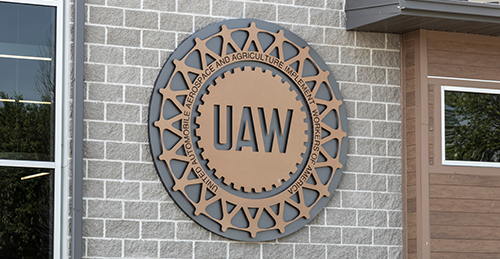 Last Wednesday Ford Motor Company reached a tentative agreement with the United Auto Workers. Though it remains to be seen what else was agreed to, the tentative deal increases wages 25% over the life of the contract. Top wage jobs will see cumulative wages rise 30% to over $40/hr. Starting wages will increase 68% to over $28/hr. Stellantis agreed to a similar deal last Saturday that mirrors the Ford deal.
Last Wednesday Ford Motor Company reached a tentative agreement with the United Auto Workers. Though it remains to be seen what else was agreed to, the tentative deal increases wages 25% over the life of the contract. Top wage jobs will see cumulative wages rise 30% to over $40/hr. Starting wages will increase 68% to over $28/hr. Stellantis agreed to a similar deal last Saturday that mirrors the Ford deal.
The terms of the Ford agreement are many but below are some of the major ones:
Wages:
- 25% general wage increase over the course of the agreement;
- 33% increase in top wage (with COLA);
- 68% increase in starting wage (with COLA); and
- 150% raise over the life of the contract for temporary workers.
Some lower-tier workers at Sterling Axle and Rawsonville will get up to an 85% raise immediately upon ratification of the agreement, they noted, and at ratification Ford workers will receive an immediate 11% wage increase.
Once ratified, employees will receive a $5,000 ratification bonus.
Wage Tiers will be eliminated.
Pension and retirement:
- The UAW was able to add to the pension multiplier and provide more for retirement for current retirees, members with pensions, and members with 401(k)s. However, returning to the old defined benefit pension plans seems to have gone away.
COLA:
Cost of Living Adjustments (COLA) were regained by the UAW. These payments increase wages as inflation moves. They were lost in 2009 when 2 of the 3 Detroit Three went through bankruptcy.
Other terms that were previously reported as tentatively agreed upon are:
- Profit Sharing was improved to include total company profits that includes Ford Credit with temporary employees now eligible;
- Temporary worker status was shortened to 90 days;
- The UAW got the right to strike over plant closures; and
- The EV plants were included in the agreement.
The radical ask by the UAW was for a 32-hour workweek with the same pay as a 40-hour week and overtime at time and one-half for work over 32 hours in a week. This seems to have been a throw-away demand that was dropped. However, do not be surprised if it comes back sometime during future negotiations.
The process for ratifying the contract is, according to UAW President Fain, a five-step process. First was the agreement. Second, the UAW National Leadership Counsel, which is comprised of UAW local President and bargaining chairs, came to Detroit hear the terms of the tentative agreement. The third step was that the UAW National Council, after voting, sent the tentative agreement to membership. The union hosted a Facebook Live last Sunday night to review the TA and put it online for members to review with highlights and other information. The fourth step is hosting regional meetings to walk through the tentative agreement with local UAW leaders. The final step is holding informational meetings and discussing the TA before the general membership holds ratification votes.
The ratification process could take several weeks.
Once the Stellantis agreement is finalized, it too will follow the same process.
On Monday GM appeared to reach a tentative agreement with similar terms. The main issue holding it up was whether the UAW would get entry into the joint ventures GM had established for the battery plant. GM agreed to it for the joint venture of Ultium Cells LLC battery plants with LG Energy Solution. However, there was an issue of the language in the CBA between GM and the UAW. There will be four battery plants, with the fourth a joint venture with Samsung SDI in Indiana.
So far it is estimated the strike has cost the Detroit Three up to $2.1 billion in earnings per Deutch Bank. The estimated cost of Ford’s tentative agreement in its first year is $900 million per Joel Levington, Director Credit Research at Bloomberg Intelligence. The cost per vehicle is estimated to be $800 to $900 per Ford vehicle, which in part will be passed on to the consumer in higher prices.
Once the agreements are in place, suppliers will need to take moves as well. There will likely be a downstream impact on wages and benefits, and nonunion suppliers may be in for unexpected pushes for organizing.
ASE surveyed our membership regarding the strike impact. It has impacted Michigan employers in several areas:
- Lost Revenue 79%
- Production or supply chain issues 48%
- Layoffs 40%
- Reduction in hours 38%
- Cost Reductions 25%
ASE members can view the full report via the ASE Member Dashboard under My Surveys. Non-members can request a complimentary download of the results here.
*The content in this article is as of 10/31/23.
Source: Wall Street Journal 10/30/23, Reuters 10/30/23, XYZ Channel 7 10/27/23, Bloomberg 10/25/23